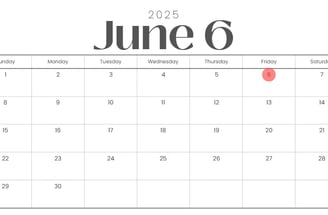Is June 6 a National Holiday? Here's What the Indian Government Says
6/6/20253 min read
Over the past few days, millions of Indians have been wondering: "Is June 6 a national holiday?" Social media platforms like WhatsApp, Facebook, and Twitter exploded with messages and forwards claiming that the Government of India had declared June 6 as a national holiday. This sparked confusion among office-goers, students, and businesses alike.
But now, the government has officially addressed the rumors—and the answer is clear.
What Was the Rumor?
In the first week of June 2025, a viral post circulated across messaging apps and social media. It claimed that the Government of India had announced a national holiday on June 6, supposedly to mark a significant event or in connection with a cultural celebration. The post looked convincingly official, even quoting government sources and showcasing what appeared to be a circular or screenshot from a government portal.
The message quickly went viral, causing people to question whether they had a day off. Employers started receiving inquiries, students began celebrating prematurely, and HR departments scrambled to verify the authenticity.
The Government's Clarification
To put an end to the confusion, the Press Information Bureau (PIB) released a clear statement on its official platform. The government confirmed that June 6 is not a national holiday, and no such announcement has been made by any authorized department.
The PIB’s fact-checking unit flagged the viral message as fake news, warning citizens not to trust or share unverified information. They emphasized that any updates regarding national holidays are published officially by the Ministry of Personnel, Public Grievances, and Pensions on their website and through Gazette notifications.
Why Did This Rumor Spread?
Misinformation like this isn’t new. In recent years, India has witnessed a surge in fake news shared via forwards and meme-style graphics. Several factors contribute to the spread of such false claims:
Lack of verification habits – People often forward messages without fact-checking.
Realistic formatting – Many fake messages use logos, formatting, and phrasing similar to government announcements.
High engagement during festivals/events – With Eid-al-Adha observed around the same time in certain states, people assumed June 6 was related to the holiday.
This incident highlights the urgent need for digital literacy and encourages people to rely on official sources rather than WhatsApp groups or viral tweets.
So, Which Holidays Are Actually Official?
In India, national holidays are typically reserved for major events such as:
Republic Day – January 26
Independence Day – August 15
Gandhi Jayanti – October 2
These are declared as compulsory national holidays and are observed across all states and sectors. Apart from these, gazetted holidays and restricted holidays vary by state and organization. In the month of June 2025, one recognized public holiday is Eid-al-Adha (Bakrid), which is being celebrated on June 17 in most regions, although some states observed it earlier or later based on the moon sighting.
What Does It Mean for Employees?
Employees across India often rely on office calendars or government circulars to plan their leaves. This confusion over June 6 led many to believe they had a long weekend lined up. Unfortunately, unless you live in a state where a local holiday was declared, June 6, 2025, remains a regular working day.
Employers are encouraged to clarify such doubts to avoid last-minute absenteeism. HR departments may also consider sharing authentic holiday calendars sourced directly from the Ministry of Personnel’s official notification.
How to Fact-Check Future Holiday Claims
In an age where misinformation spreads faster than truth, it's important to know how to validate news. Here are a few simple tips to avoid being misled:
Visit the official government holiday list on https://dopt.gov.in
Use PIB Fact Check, available on Twitter/X and the official PIB website
Cross-check with your employer's HR team or local government websites
Avoid relying on screenshots or messages without links to credible sources
If you're unsure, assume it's not true until proven otherwise.
Role of Social Media and the Need for Responsibility
Social media platforms offer unparalleled speed and reach, but with that power comes responsibility. It’s important for individuals to pause and verify before forwarding messages. A single misleading tweet or viral meme can lead to nationwide confusion, especially regarding public holidays.
Government agencies, influencers, and even news media should also step up to curb the spread of false information by educating users and providing timely clarifications.
Why This Story Matters
This may seem like a harmless rumor at first glance. But in a country as diverse and busy as India, the impact of misinformation can be significant. Public transportation plans get disrupted, business operations go haywire, and millions waste time planning around false data.
Moreover, it shows how easily a society can be manipulated in the digital age. It raises important questions about data authenticity, media consumption habits, and digital responsibility.

